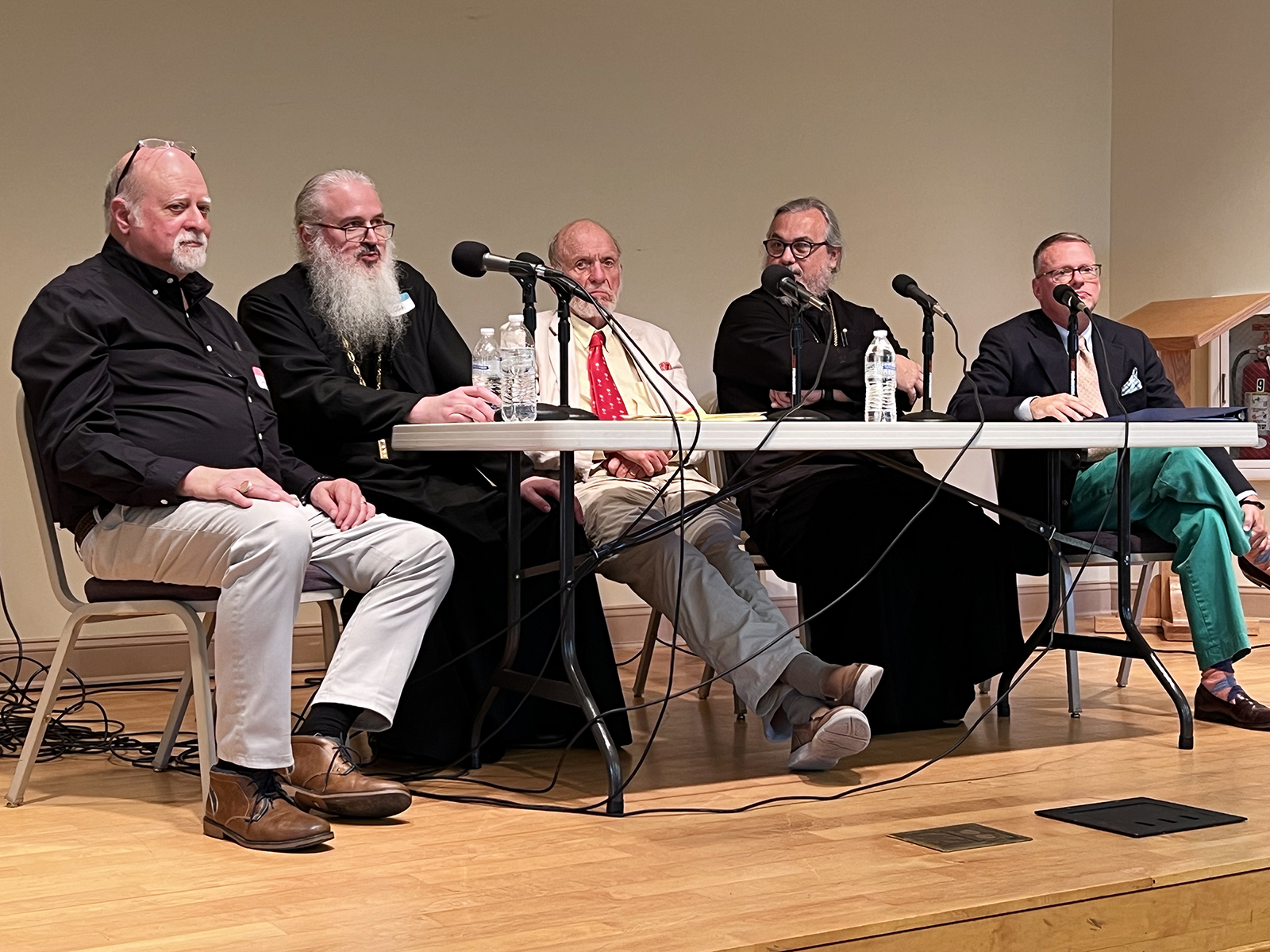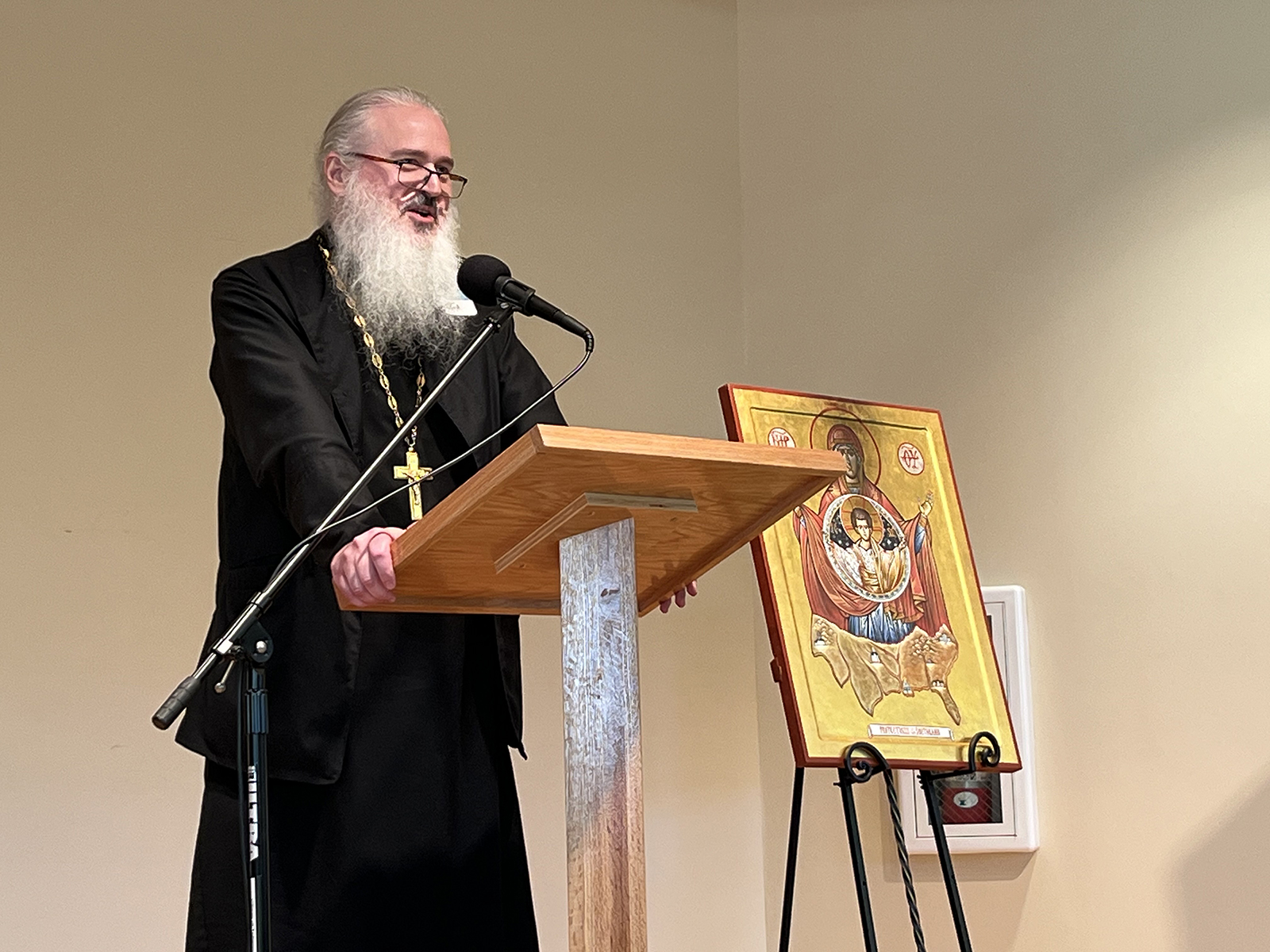
TOBACCOVILLE, N.C. (RNS) — Orthodox Christianity in the United States is a kaleidoscope of languages and cultures as diverse as Russia, Greece, Ethiopia, Syria, Bulgaria and, increasingly, the American South.
Aiming to forge that burgeoning Southern Orthodox identity is the Philip Ludwell III Orthodox Fellowship, which kicked off its inaugural conference in the small North Carolina village of Tobaccoville, just northwest of Winston-Salem, on Saturday (Sept. 16) with coffee, muffins and a welcome table papered with reimagined Southern state flags: each overlaid with a white three-bar Russian Orthodox cross.
Philip Ludwell III, the fellowship’s namesake, became one of America’s earliest converts to Orthodoxy in 1738 and then translated Russian Orthodox texts into English. His family held government positions in the Carolinas and Virginia and shared ancestry with Confederate Gen. Robert E. Lee, born nearly a century later.
“We love Jesus, we honor our ancestors, and we want Orthodoxy to grow in our homeland,” said Rebecca Dillingham, a co-founder of the fellowship. “It’s pretty simple, and that’s why the inaugural conference was a success. Doesn’t take a Ph.D. to figure that out.”
Many of the conference attendees and speakers call themselves traditionalists, advocating for young marriages, home schooling, and trade schools over universities. Many also believe monarchy is the best form of government but begrudgingly accept liberal democracy. They’re unhappy with both political parties, but for most, Donald Trump is the favored option for president.

George Michalopulos, from left, the Rev. John Whiteford, Don Livingston, the Rev. Mark Mancuso and Clark Carlton were all speakers during the Philip Ludwell III Orthodox Fellowship inaugural conference in Tobaccoville, N.C. Photo by Meagan Saliashvili
While many jurisdictions were represented, including Antiochian, Serbian, Greek and Orthodox Church of America, the majority of attendees appeared to represent the Russian Orthodox Church Outside of Russia (commonly called ROCOR), a semi-autonomous part of the Russian Orthodox Church in Moscow.
The 125 attendees from at least 10 states at the weekend conference mingled over North Carolina BBQ, listened to speeches, participated in Q&A’s and gathered for Saturday evening and Sunday morning worship at Dillingham’s parish down the road. More tried to sign up but the event was capped to comply with the fire code.
Dillingham, who organized the conference and was referred to as the “Energizer Bunny” of the fellowship, also runs the “Dissident Mama” blog and podcast, where she expresses her self-described “unapproved opinions.” She wrote anonymously until a hate-watch researcher doxxed her in 2020. She has argued for the South to secede from the U.S. again, opposed the removal of Confederate statues from public land and attempted to show parallels between Southern and Russian identity. She has compared what she sees as American authoritarianism imposed on the South to the suffering inflicted by Bolsheviks and has likened figures such as Lee, wrongly demonized in her opinion, to Russia’s President Vladimir Putin.
Like almost all of the attendees, Dillingham has no ethnic ties to an Orthodox country but converted to Orthodoxy years ago — after living as an atheist, feminist and “communist hippie,” she has explained on her podcast.
Evangelicals in particular have been converting to Orthodoxy for decades as English language liturgies became more common. Then the internet facilitated a constellation of blogs and podcasts about Orthodoxy, which, together with the pandemic lockdowns, has led to explosive growth in some Orthodox parishes, particularly across the South. Historically, Orthodoxy has been concentrated more in Alaska and urban pockets where Slavic, Balkan and Middle Eastern immigrants have settled.
A recent study on the effects of the pandemic on Orthodox parishes in the U.S. found that while most Orthodox churches shrank an average 15% in regular attendees from 2020 to 2022, 1 in 5 parishes grew their membership and in-person attendance by 20%.
Dillingham’s ROCOR parish in Tobaccoville, St. Thomas the Apostle Orthodox Church, is about 95% converts and has grown to about 80 weekly attendees since its 2019 start, according to her. Members first gathered in a small backyard tool shed, desiring English-language Russian Orthodox services that they couldn’t find close by. The congregation expanded onto the lawn during 2020 lockdowns, attracting worshippers from churches whose doors closed for online-only services. Now they meet in a building they bought from a Methodist church.
The Rev. John Whiteford, the other co-founder of the fellowship, is a priest in Spring, Texas, at St. Jonah Russian Orthodox Church, also ROCOR, which doubled during the pandemic to about 150 weekly attendees, he said. In his address Saturday, Whiteford emphasized that Southern culture and American culture are different.
“The American way is to impose our democracy and make everyone like us … but not everyone wants to be American,” he said from a podium. “The foreign policy of the South generally has been isolationist … but America provokes incidents, starts wars.”
Whiteford didn’t mention the Russian invasion of Ukraine but has written on his blog why he believes NATO and the U.S. provoked Russia. In his speech, he also said that American culture’s materialism and capitalism are in contrast to the South’s past agrarianism. Recently returned from a trip to several Moldovan villages, he made the case for why Orthodox Christians should garden and farm.
“If we can have land to raise chickens and goats, we should, because kids who grow up around farm animals have the sense to know male and female,” he quipped.

The Rev. John Whiteford addresses the Philip Ludwell III Orthodox Fellowship conference in Tobaccoville, N.C., beside a commissioned icon of Mary and Jesus titled “Protectress of the Southland.” Photo by Meagan Saliashvili
All of the event’s speakers oppose same-sex marriages and argue that its legalization is having negative effects on traditional families.
“If there is a distinctive American culture it is Disney media, consumerism and sodomy,” said Clark Carlton, an author, assistant philosophy professor at Tennessee Tech University and a co-founder of the Ludwell fellowship, during a speech at the event.
Metropolitan Jonah Paffhausen, a retired bishop of ROCOR and rector of St. Herman of Alaska Orthodox Church in Stafford, Virginia, who was forced to resign from the Orthodox Church in America in part for comments seen as incendiary, spoke about how the South must combat the “radical ideology” of the North, which he described as formed by socialism and Marxism and based on hatred of God, religion, art, music and the traditional family.
“We have to stand up against this,” he said. “I don’t think standing up in violent revolution is going to do it, but … we have to stand up for the truth.”
Paffhausen also advised that new converts stop arguing about doctrine online, especially in vulgar terms, to show love instead of anger, and to respect non-Orthodox Christian faiths while sharing about Orthodoxy. Both Whiteford and Paffhausen are converts to the faith from Protestant backgrounds, Whiteford from the Church of the Nazarene and Paffhausen from Episcopalianism.
Notably few attendees at the conference were “cradle” Orthodox Christians and clergy who have historically been the preservers of Orthodoxy in the U.S.
Sarah Riccardi-Swartz, a scholar of Orthodoxy in the U.S. and author of “Between Heaven and Russia,” said she receives a lot of emails from Orthodox Christians “who are really concerned about the trajectory of their parishes” and believe converts are pulling their churches into right-wing politics, she said.
“They’re worried, and they don’t know what to do,” Riccardi-Swartz said. “My first reaction is, talk to your priest.”
There is no uniform way of receiving converts into the church, and Riccardi-Swartz believes clergy, deacons and catechist teachers need to do more to educate people who are reading about Orthodoxy online, sometimes from sources like Dillingham and Whiteford, whom she considers radicalized.
“Because Orthodoxy is small (in the U.S.), they think that these Orthodox figures online are helpful because we’re getting more converts in,” she said. “They think we are building American Orthodoxy. No, we’re not. We’re creating an American Orthodoxy that’s not in line with the gospel but rather with right-wing extremism.”
These tensions — over gender, nationalism and the impacts of the Russia-Ukraine war — reflect the identity battles fragmenting Orthodoxy around the world.
Updated to correct attribution of a quote.
